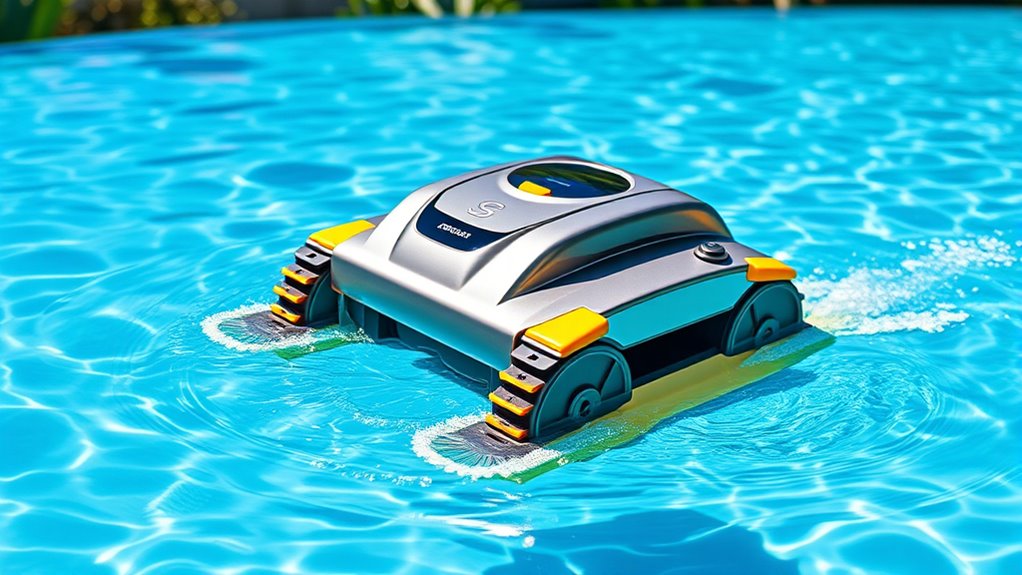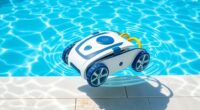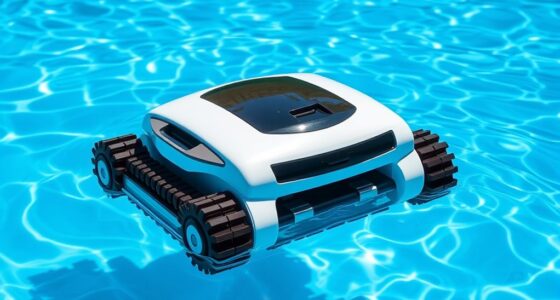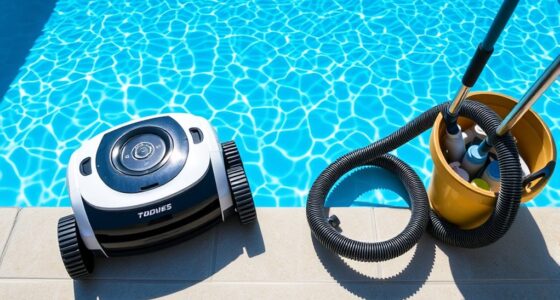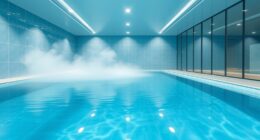Pressure pool cleaners are still relevant if you want to efficiently remove large debris and keep your pool looking clean with a cost-effective option. They work well in certain scenarios, like reaching difficult spots and promoting good water circulation, but they do have limitations — such as missed spots and higher energy use. If you’d like to understand when and how to get the most from pressure cleaners, there’s more to discover below.
Key Takeaways
- They effectively remove large debris and reach difficult spots, making them useful for targeted cleaning tasks.
- Their high energy consumption and maintenance needs make robotic and suction cleaners more convenient options.
- Modern innovations like smart sensors have enhanced robotic cleaners’ efficiency, reducing the relevance of traditional pressure models.
- Pressure cleaners excel in handling heavy debris but can miss small particles, limiting overall coverage.
- Overall, their role depends on specific pool needs, with newer technologies often offering more efficient and eco-friendly solutions.
How Pressure Pool Cleaners Operate
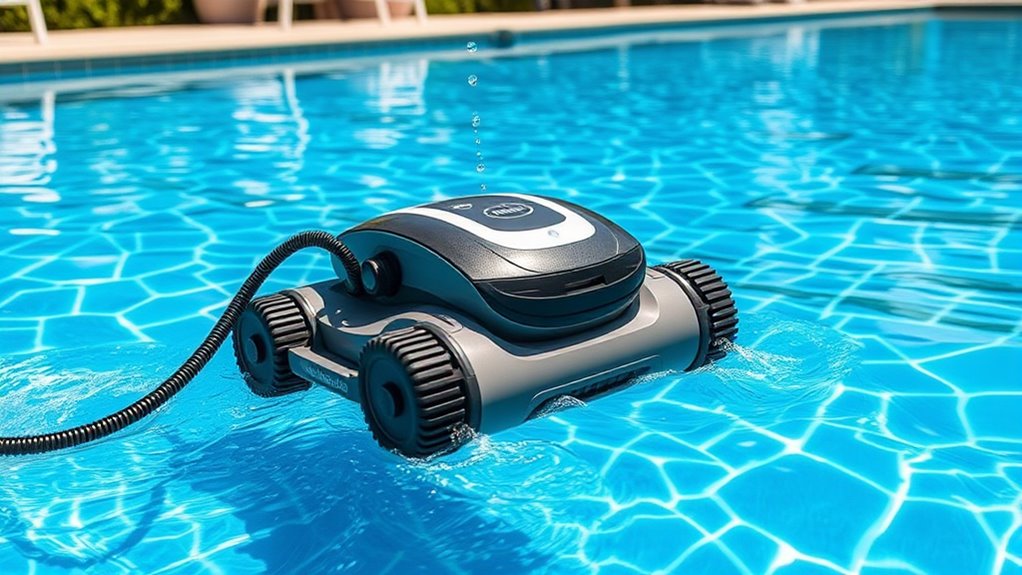
Pressure pool cleaners work by using high-pressure water jets to move around your pool and lift debris from the surface and bottom. They rely on the force of water to propel themselves across the pool, effectively cleaning as they go. Proper pool chemistry is crucial for ideal results, as balanced chemicals help prevent algae and debris buildup, making cleaning more efficient. They often work best in conjunction with filter systems that trap the loosened debris, ensuring thorough cleaning. If you have pool covers, pressure cleaners can work effectively underneath to remove leaves and dirt that settle when the cover is on. These cleaners are designed to handle various debris types, ensuring your pool remains clear and inviting. Maintaining clean and balanced water is essential for optimal cleaner performance and to prevent spoilage or buildup of unwanted substances. Additionally, selecting the right tuning options can improve the efficiency of your pool equipment, similar to how automotive tuning enhances vehicle performance. Understanding how they operate, including advanced cleaning techniques, can help you better maintain your pool’s cleanliness and ensure the cleaner performs at its best. For improved results, considering current technological advancements can further optimize your cleaning process.
Advantages of Traditional Pressure Cleaners
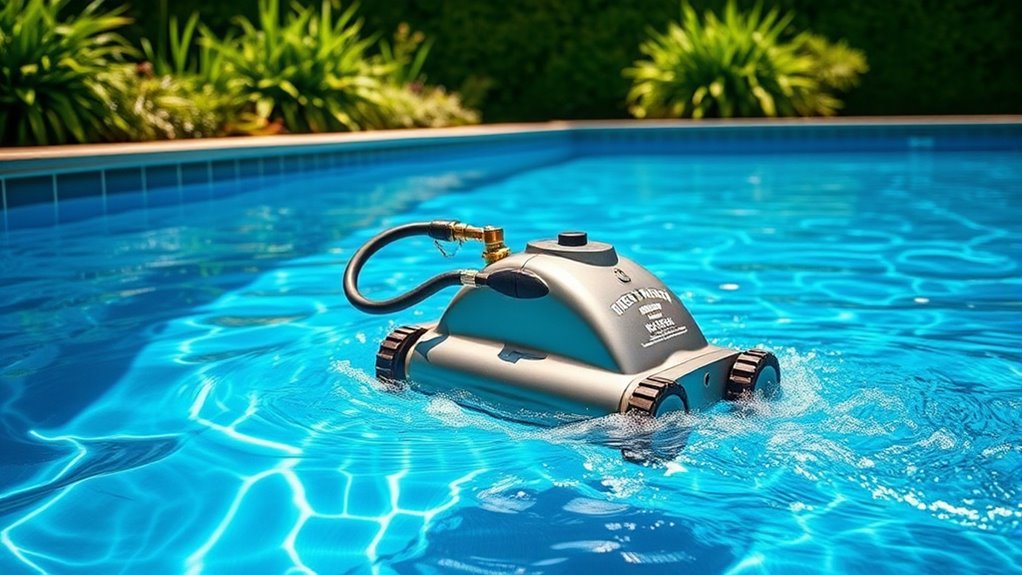
Traditional pressure cleaners offer several advantages that make them a popular choice for pool maintenance. One key benefit is their ability to improve pool aesthetics by effectively removing dirt, algae, and debris from the pool surface and floor. This helps keep your pool looking inviting and well-maintained. Additionally, pressure cleaners enhance water circulation, which prevents stagnation and distributes chemicals evenly. Better water movement also reduces the buildup of algae and bacteria, promoting a healthier swimming environment. Unlike some other cleaning methods, pressure cleaners can handle larger debris and reach difficult spots, ensuring a thorough clean. Overall, their efficiency, ability to maintain pool beauty, and support for ideal water flow make traditional pressure cleaners a reliable option for many pool owners.
Limitations and Challenges Faced by Pressure Cleaners

While pressure pool cleaners are effective, they do have limitations. You might find that their cleaning coverage is restricted, and they can consume a lot of energy. Additionally, keeping them in good shape often means dealing with maintenance challenges. Their efficiency can also be impacted by technology differences, which affect their overall performance and image quality. Moreover, some models may struggle with clogging or debris removal, reducing their effectiveness during heavy dirt conditions. As with many AI-driven solutions, trustworthiness and vulnerabilities are ongoing concerns that can influence their reliability and user confidence. Furthermore, the variability in Volkswagen Tuning quality and compatibility can serve as an analogy to how pressure cleaners may perform inconsistently depending on the model and maintenance. Proper understanding of headphone connectivity options can also influence maintenance and troubleshooting.
Limited Cleaning Coverage
Have you ever noticed that pressure pool cleaners sometimes miss spots or struggle to reach all areas of your pool? These cleaners often have coverage gaps, leaving certain sections untouched. They can also face debris limitations, especially with larger or heavier debris that they can’t effectively pick up. Narrow corners, steps, and shallow areas may be overlooked, requiring manual cleaning or additional tools. This limited cleaning coverage means you might still need to do some spot cleaning yourself. While pressure cleaners can handle a good portion of debris, they aren’t always thorough enough for all-encompassing pool maintenance. Additionally, pressure cleaner performance can diminish over time if not properly maintained and serviced. The effectiveness of these cleaners is also influenced by technology limitations, which can affect their ability to adapt to different pool shapes and conditions. Moreover, advancements in automated pool cleaning technology continue to improve coverage and efficiency, making some modern models a viable alternative. As technology evolves, many users are turning to robotic cleaners that offer more comprehensive and consistent coverage for their pools.
High Energy Consumption
Ever wondered why pressure pool cleaners can spike your energy bills? The main reason is their high energy consumption, leading to significant energy waste and cost concerns. These cleaners often run for hours, consuming power inefficiently. To understand, consider this:
- They operate continuously, regardless of pool size or debris load.
- Their pumps are typically more powerful than necessary, wasting electricity.
- Maintenance issues can cause the motor to work harder, increasing energy use.
- Incorporating AI-powered features could potentially optimize operation times and reduce energy consumption.
- Advances in heat pump technology offer more energy-efficient options for pool heating and cleaning systems, which could be integrated into modern pool maintenance solutions.
- Additionally, energy-efficient motors and smart scheduling can help minimize unnecessary power usage, making cleaning more economical.
- The overall efficiency of these systems can be further improved by utilizing filtering and pump protection techniques, reducing strain on equipment and conserving energy. Moreover, implementing smart controls can enhance operational efficiency by adjusting cleaning cycles based on real-time data, further reducing energy wastage.
Because of these factors, you might find yourself facing higher utility bills. While pressure pool cleaners are effective, their energy demands can make them less economical over time. If you’re concerned about energy waste and costs, it’s worth exploring more efficient cleaning options.
Maintenance Challenges
Pressure pool cleaners often face maintenance challenges that can hinder their efficiency and lifespan. One key issue is dealing with chemical imbalance, which affects their ability to clean effectively and can lead to equipment corrosion or damage. If your pool’s chemistry isn’t balanced, algae prevention becomes more difficult, risking algae buildup that pressure cleaners may struggle to remove thoroughly. Regular monitoring of water chemistry is essential to keep the system running smoothly. Additionally, debris clogging the jets or filters can cause malfunctions, requiring frequent cleaning and maintenance. Over time, mineral buildup and wear on moving parts can reduce performance. Staying vigilant with chemical adjustments and routine upkeep helps mitigate these challenges, ensuring your pressure cleaner remains effective and lasts longer. Proper installation and venting are also important to prevent potential equipment issues.
Comparing Pressure Cleaners With Robotic and Suction Models
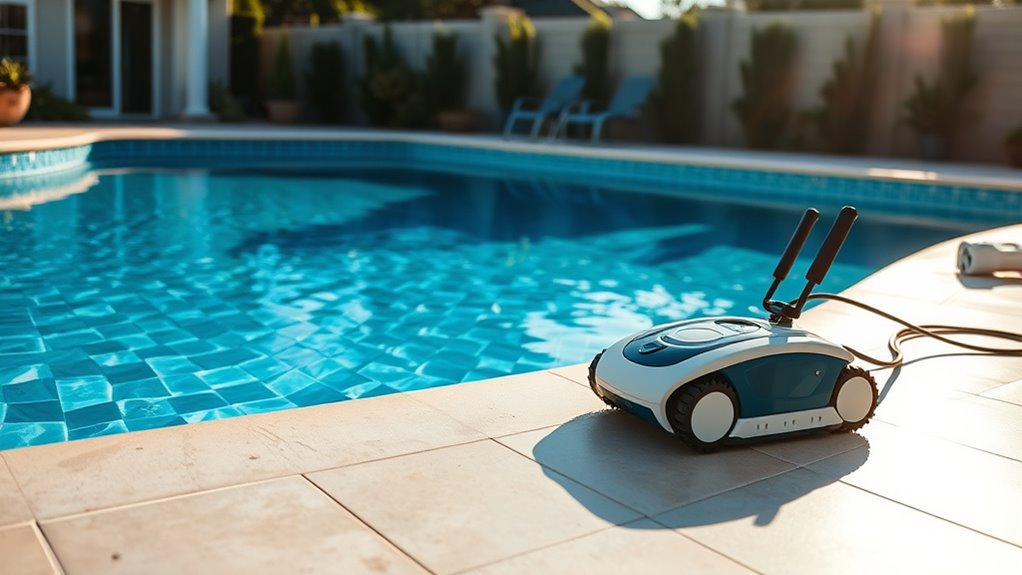
When comparing pressure cleaners to robotic and suction models, you’ll notice differences in cleaning efficiency and maintenance. Robotic cleaners often cover the pool more thoroughly with less effort, while suction models are simpler to keep in shape. Understanding these distinctions helps you choose the best option for your pool’s needs.
Cleaning Efficiency Differences
While all pressure pool cleaners are designed to keep your pool spotless, they vary markedly in cleaning efficiency compared to robotic and suction models. Pressure cleaners tend to focus on cleaning speed and debris removal, but their effectiveness depends on several factors.
- Cleaning speed: Robotic models often operate faster, covering more area quickly.
- Debris removal: Suction models excel at picking up fine particles and small debris.
- Targeted cleaning: Robotic cleaners are better at maneuvering through complex areas, ensuring thorough debris removal.
Pressure cleaners are ideal for larger debris, but robotic and suction models typically offer superior overall cleaning efficiency. If quick, thorough cleaning is your priority, consider these differences carefully.
Ease of Maintenance
Compared to robotic and suction models, pressure pool cleaners generally require more hands-on maintenance, which can influence your overall upkeep routine. They often need regular filter cleaning, hose adjustments, and occasional parts replacement, making them less convenient for quick upkeep. While pressure cleaners may have a lower initial cost, their ongoing maintenance can reduce their overall cost efficiency. Robotic models, on the other hand, typically offer greater user convenience with fewer adjustments and easier cleaning. Suction cleaners also tend to be simpler to maintain. If you prioritize minimal effort and straightforward upkeep, robotic or suction options might serve you better. Pressure cleaners, though more involved, can still be effective if you’re willing to dedicate time to their maintenance.
Cost-Effectiveness and Maintenance Considerations
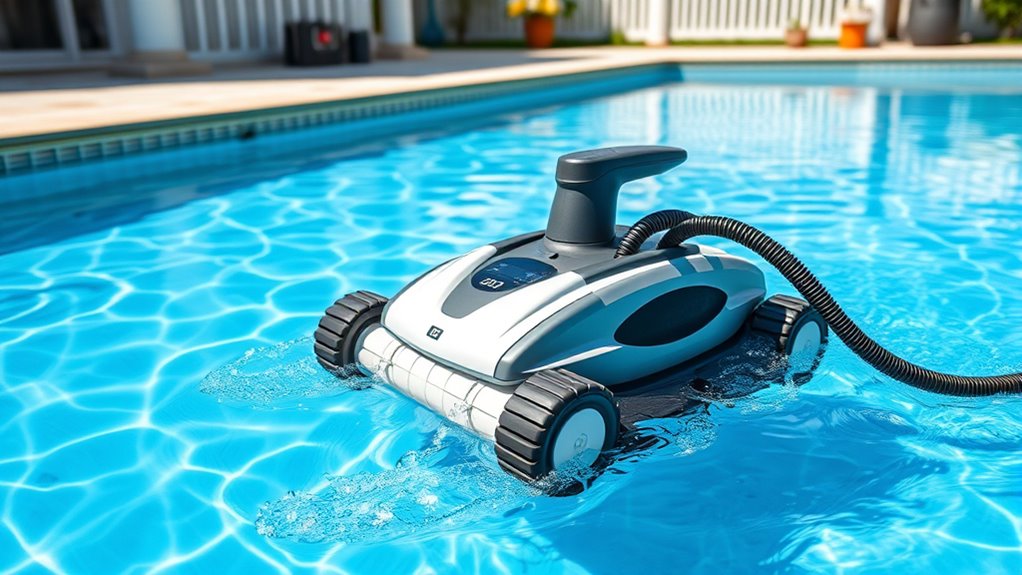
Pressure pool cleaners often prove to be a cost-effective choice over time because they require less frequent maintenance and have fewer parts that need replacement. When considering cost analysis, you’ll find that initial investment is moderate, and ongoing maintenance costs remain low. To maximize savings, keep these points in mind:
- Regularly inspect hoses and connections to prevent costly repairs.
- Replace worn-out brushes and diaphragms promptly to avoid further damage.
- Schedule routine filter cleanings to maintain advantageous performance and reduce energy use.
Modern Innovations in Pool Cleaning Technology
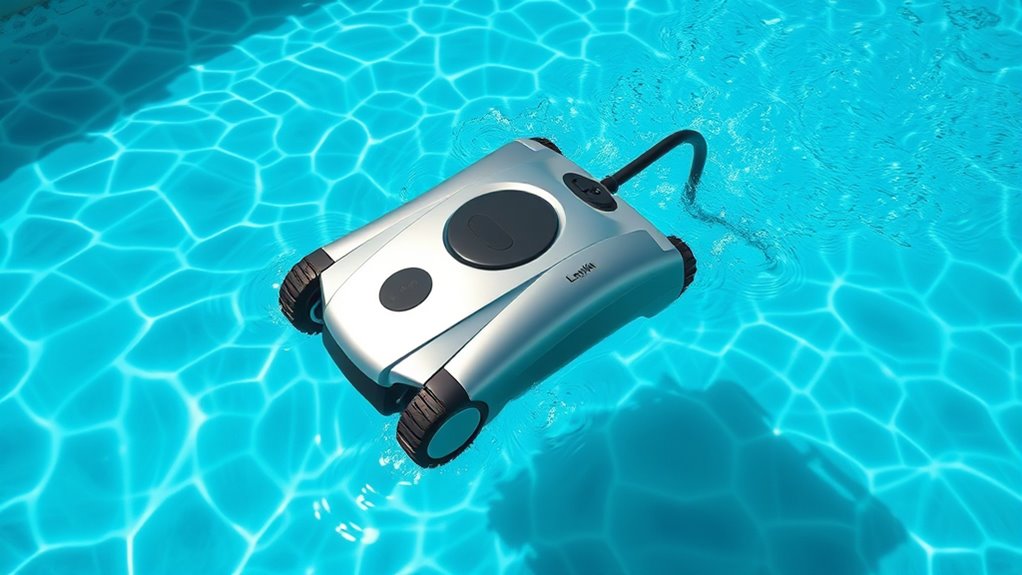
Advancements in pool cleaning technology have revolutionized how you maintain your pool, making the process more efficient and effective. Smart pool technology now allows your cleaner to operate intelligently, adapting to your pool’s shape and debris levels for ideal cleaning. These systems often integrate sensors and programmable features, reducing the need for manual oversight. Eco-friendly cleaning solutions have also gained popularity, using less water and energy while minimizing chemical use. Some modern cleaners even utilize sustainable materials and renewable energy sources, aligning with environmentally conscious practices. With these innovations, maintaining a sparkling pool becomes less time-consuming and more sustainable. Whether you choose robotic cleaners or smart, eco-friendly systems, technology now offers smarter, greener ways to keep your pool pristine.
Ideal Scenarios for Using Pressure Pool Cleaners
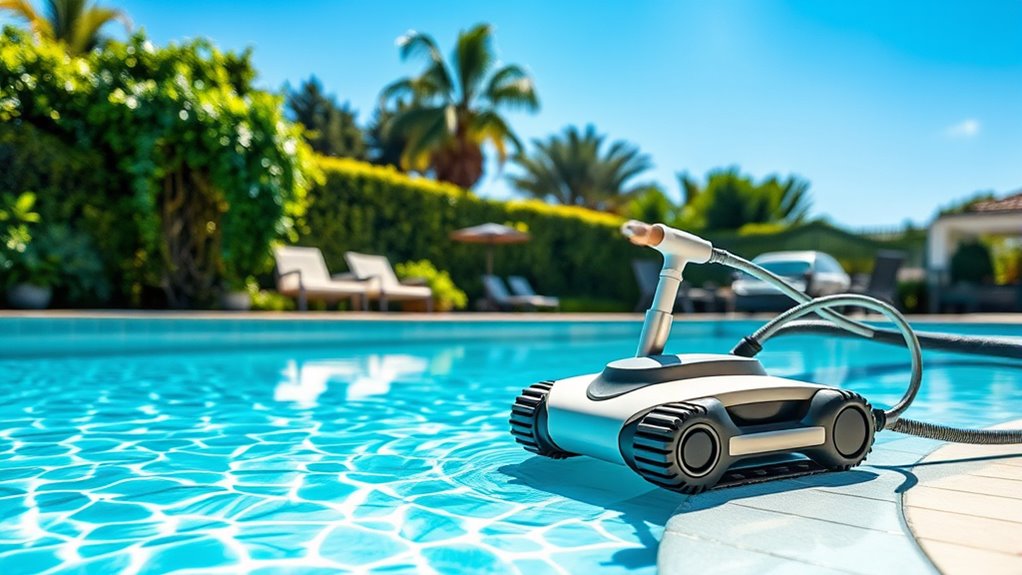
Pressure pool cleaners are especially effective in situations where your pool has heavy debris loads or specific areas that require targeted cleaning. If you notice leaves, dirt, or algae buildup in hard-to-reach spots, a pressure cleaner can efficiently handle these. They also help maintain pool safety by reducing slipping hazards caused by debris. Additionally, pressure cleaners boost your pool’s aesthetic appeal by delivering a thorough clean that leaves the water sparkling. Consider using a pressure cleaner when:
- Debris accumulates quickly after storms or heavy winds
- You want to target algae-prone or hard-to-access zones
- Regular maintenance demands a deep, consistent clean for peak pool safety and appearance
These scenarios highlight when pressure pool cleaners are most beneficial in keeping your pool pristine.
Making the Right Choice for Your Pool Maintenance

Choosing the right pool maintenance equipment depends on your specific needs, budget, and the type of debris your pool typically encounters. Pressure pool cleaners can enhance your pool’s aesthetics by efficiently removing dirt, algae, and leaves, keeping the surface spotless. When selecting equipment, consider how it impacts water chemistry; a cleaner pool reduces the risk of algae growth and maintains balanced water chemistry. If your pool experiences frequent debris or has intricate features, a pressure cleaner might be an ideal choice. However, if you prioritize minimal maintenance and quiet operation, other options could be better. Think about how each cleaner fits into your routine and ensures your pool stays pristine and inviting. Making an informed choice helps you enjoy clear water and stunning pool aesthetics year-round.
Frequently Asked Questions
Are Pressure Pool Cleaners Environmentally Friendly?
Pressure pool cleaners are generally not the most eco-friendly option, as they often use electricity, raising eco-friendliness concerns. They can also contribute to water conservation issues if they waste water or require frequent maintenance. However, some models are energy-efficient and designed to minimize water usage. You should weigh their cleaning effectiveness against their environmental impact to decide if they fit your eco-conscious goals.
How Long Do Pressure Pool Cleaners Typically Last?
Pressure pool cleaners typically last between 3 to 5 years, depending on your maintenance frequency and durability concerns. Regularly inspecting and cleaning the unit can prolong its lifespan, while neglecting maintenance may shorten it. You should anticipate replacing parts or the entire cleaner as it ages. Proper care ensures your pressure pool cleaner remains effective, saving you money and effort over its lifespan.
Can Pressure Cleaners Clean Algae Effectively?
Think of pressure pool cleaners as your trusted knight, ready to battle algae invasions. They effectively handle algae removal, unlike manual operation, which can be tedious and less thorough. With their powerful jets, they reach nooks and crannies, making cleaning easier and faster. So, yes, pressure pool cleaners still prove valuable for algae control, saving you time and effort while keeping your pool sparkling clean.
Are Pressure Pool Cleaners Suitable for All Pool Sizes?
When considering if pressure pool cleaners suit your needs, think about your pool size and cleaning efficiency. These cleaners work well for larger pools, providing quick and thorough cleaning. However, for smaller pools, they might be overkill or less efficient. You should evaluate your pool size to determine if a pressure cleaner offers the best cleaning efficiency, or if a different type of cleaner might be more suitable for your specific pool.
Do Pressure Cleaners Work Well in Automatic or Manual Modes?
Using a pressure pool cleaner is like having a reliable helper by your side. When it comes to manual operation, you control the cleaning process, guiding it to tough spots. With automatic functionality, it works tirelessly on its own, covering your pool efficiently. Both modes have their perks, so you can choose based on your needs. Overall, pressure cleaners adapt well, whether you’re hands-on or prefer a set-it-and-forget-it approach.
Conclusion
While pressure pool cleaners may not be the newest players on the block, they still hold a quiet charm in certain situations. If you value simplicity and familiar routines, they can serve you well. Just keep in mind their quirks and limitations. Sometimes, the traditional option offers a gentle touch that newer technologies haven’t fully replaced. Ultimately, choosing what’s best depends on your pool’s needs and your personal preference.

